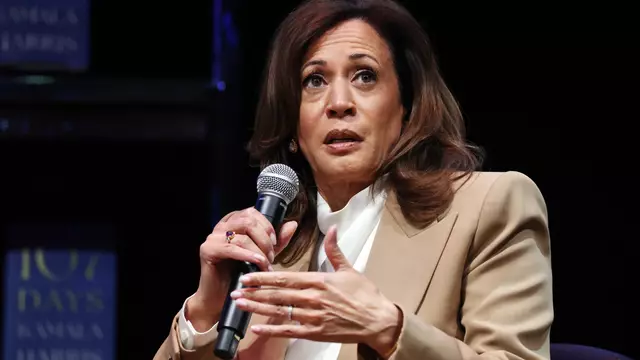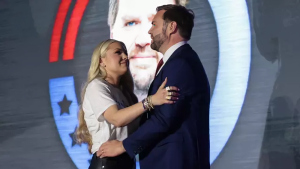WASHINGTON, D.C. — Former Vice President Kamala Harris has revealed that her doubts about President Joe Biden’s fitness for the 2024 campaign began long before his now-infamous debate performance against Donald Trump — a moment that effectively ended his reelection bid and reshaped the political landscape.
Speaking candidly on the Diary of a CEO podcast with Steven Bartlett, Harris described a phone call that first triggered her concern, painting a picture of a president already struggling months before stepping onto the debate stage.
“He called me from debate camp,” Harris recalled, “and I could tell something was a little off. I was concerned… I just don’t think he wanted to debate.”
According to Harris, the call came while Biden was preparing for his first head-to-head matchup with Trump in June 2024. She said he seemed “feeble” and “unsure,” often stumbling over his words — a foreshadowing of the halting, disjointed performance that would later send shockwaves through his own party.
A Debate That Changed Everything
The June 2024 debate quickly became one of the defining moments of modern American politics. Biden’s uneven delivery, slurred phrases, and moments of visible confusion left many Democrats stunned — and gave Republicans new momentum heading into the election season.
Within weeks, Democratic donors and senior officials began quietly calling for Biden to step aside. By mid-July, after intense internal pressure, he withdrew from the race, clearing the path for Harris to secure the party’s nomination.
But Harris now says the signs were visible long before that night.
‘He Didn’t Want the Debate’
Harris told Bartlett she believed Biden’s reluctance to debate reflected deeper concerns about his energy and confidence.
“He didn’t want that debate,” she said. “And you know, it’s like any competition — if you don’t want to be in it, it will absolutely have an impact on your performance. I’m pretty sure he didn’t want to debate.”
When Bartlett pressed her on how she knew, Harris admitted that the two had “conversations” about it, suggesting Biden was “talked into it” by advisers or party strategists.
Watching It Unfold
Harris said she deliberately chose to watch the debate with only a small group of aides in Los Angeles, hoping to stay candid in her reactions.
“There’s no such thing as a perfect debate,” she noted. “There’s always something to clean up, and I expected that. And then, you know… we saw what we all saw.”
The moment forced a reckoning within the Democratic Party. Polls showed Biden’s support plummeting within days, and campaign insiders described a mood of disbelief inside the White House.
Private Concerns, Public Restraint
In her recently released memoir, 107 Days, Harris reflects on the turbulent period that followed, recounting the 2024 campaign and her transition from vice president to presidential nominee.
One section, in particular, has drawn attention: her admission that she considered telling Biden not to run for reelection but ultimately decided against it.
“At the time, I worried it would seem self-serving,” Harris wrote. “I was the vice president — and if he stepped aside, I would be the one to benefit. It felt inappropriate, even if it was the right thing to say.”
When asked about that passage during an interview with MSNBC’s Rachel Maddow earlier this month, Harris offered a blunt reassessment.
“We all said that — that it was his and Jill’s decision alone,” she said. “We said it like a mantra. Was it grace, or was it recklessness? In retrospect, I think it was recklessness.”
Inside the Decision to Step Aside
By the time Biden made his announcement in July 2024, aides and close allies had already acknowledged privately that his health and stamina were limiting his ability to campaign effectively.
According to several reports from that period, the president’s debate performance convinced even longtime supporters that the path forward was untenable.
Harris, who was vacationing with family when Biden called to inform her of his decision, described the conversation as “emotional” but “dignified.”
“He told me he wanted to hand over the baton in a way that honored the office,” Harris said. “That was who Joe was — loyal to the end.”
The Transition and Aftermath
Following Biden’s withdrawal, Harris swiftly consolidated support within the Democratic Party. Her campaign — rebranded around the theme of “A New Generation of Leadership” — went on to unify much of the fractured base that had grown disillusioned after months of uncertainty.
Still, the question of whether senior Democrats ignored early warning signs about Biden’s condition has continued to loom large.
Political analysts say Harris’s new remarks may reignite that debate, especially as she seeks to present herself as both loyal to Biden’s legacy and independent of his missteps.
“Kamala Harris has to walk a tightrope,” said political analyst Robert Costa. “She was part of the administration but also the one who benefited most from its collapse. Every new revelation about Biden’s decline inevitably puts her own choices under scrutiny.”
A Moment of Reflection
Asked by Bartlett if she would have done anything differently, Harris hesitated.
“I have and had a certain responsibility that I should’ve followed through on,” she said quietly. “Maybe I should’ve been more direct. But at that time, I thought I was doing the respectful thing.”
The interview offered one of Harris’s most introspective looks yet at the chaotic months that upended the 2024 race. For many observers, it also marked a subtle attempt to shape her own historical narrative — one in which she appears not as a bystander to Biden’s downfall, but as someone who saw the warning signs early.
As the country looks ahead to the next election cycle, her comments serve as a reminder of how close the Democratic Party came to unraveling from within — and how one debate forever altered the course of U.S. politics.

James Jenkins is a celebrated Pulitzer Prize-winning author whose work has reshaped the way readers think about social justice and human rights in America. Raised in Atlanta, Georgia, James grew up in a community that instilled in him both resilience and a strong sense of responsibility toward others. After studying political science and creative writing at Howard University, he worked as a journalist covering civil rights issues before dedicating himself fully to fiction. His novels are known for their sharp, empathetic portraits of marginalized communities and for weaving personal stories with broader political realities. Jenkins’s breakout novel, Shadows of Freedom, won national acclaim for its unflinching look at systemic inequality, while his more recent works explore themes of identity, resilience, and the fight for dignity in the face of oppression. Beyond his novels, James is an active public speaker, lecturing at universities and participating in nonprofit initiatives that support literacy and community empowerment. He believes that storytelling is a way to preserve history and inspire change. When not writing, James enjoys jazz music, mentoring young writers, and traveling with his family to explore cultures and stories around the world.









